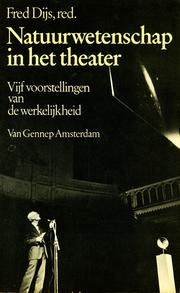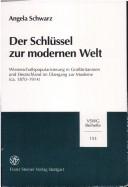| Listing 1 - 10 of 1698 | << page >> |
Sort by
|
Book
Year: 1659 Publisher: London : Printed for Charles Webb at the Bore's Head in St Paul's Church yard,
Abstract | Keywords | Export | Availability | Bookmark
 Loading...
Loading...Choose an application
- Reference Manager
- EndNote
- RefWorks (Direct export to RefWorks)
Book
ISBN: 9781317369820 9781315671338 9781138945494 9781138945500 Year: 2017 Publisher: Abingdon Routledge
Abstract | Keywords | Export | Availability | Bookmark
 Loading...
Loading...Choose an application
- Reference Manager
- EndNote
- RefWorks (Direct export to RefWorks)
Science Journalism: An Introduction gives wide-ranging guidance on producing journalistic content about different areas of scientific research. It provides a step-by-step guide to mastering the practical skills necessary for covering scientific stories and explaining the business behind the industry. Martin W. Angler, an experienced science and technology journalist, covers the main stages involved in getting an article written and published; from choosing an idea, structuring your pitch, researching and interviewing, to writing effectively for magazines, newspapers and online publications. There are chapters dedicated to investigative reporting, handling scientific data and explaining scientific practice and research findings to a non-specialist audience. Coverage in the chapters is supported by reading lists, review questions and practical exercises. The book also includes extensive interviews with established science journalists, scholars and scientists that provide tips on building a career in science journalism, address what makes a good reporter and discuss the current issues they face professionally. The book concludes by laying out the numerous available routes into science journalism, such as relevant writing programs, fellowships, awards and successful online science magazines. For students of journalism and professional journalists at all levels, this book offers an invaluable overview of contemporary science journalism with an emphasis on professional journalistic practice and success in the digital age.

ISBN: 9060127277 Year: 1987 Publisher: Van Gennep
Abstract | Keywords | Export | Availability | Bookmark
 Loading...
Loading...Choose an application
- Reference Manager
- EndNote
- RefWorks (Direct export to RefWorks)
Periodical
Year: 2014 Publisher: Rüfenacht, Switzerland : Berner Kantonalgesangverband,
Abstract | Keywords | Export | Availability | Bookmark
 Loading...
Loading...Choose an application
- Reference Manager
- EndNote
- RefWorks (Direct export to RefWorks)
Book
ISBN: 0871240637 Year: 1980 Publisher: New York (N.Y.): Foreign policy association
Abstract | Keywords | Export | Availability | Bookmark
 Loading...
Loading...Choose an application
- Reference Manager
- EndNote
- RefWorks (Direct export to RefWorks)
Book
Year: 2017 Publisher: Riga : NATO Strategic Communications Centre of Excellence,
Abstract | Keywords | Export | Availability | Bookmark
 Loading...
Loading...Choose an application
- Reference Manager
- EndNote
- RefWorks (Direct export to RefWorks)
The study investigates misinformation and disinformation on social media in the context of the rise of 'fake news' and the birth of the 'post-truth' era. Are these concerns substantiated by facts? What are the consequences of these phenomena for the information environment? Most importantly, do these phenomena pose a threat for our societal security? This study will provide actionable knowledge by answering to these questions. This introduction is an attempt to position the emergence of 'fake news' in a wider societal context. Particular emphasis is placed on the cognitive biases that enable information manipulation. In turn, this will lead to a discussion about the tactics employed by adversarial actors to carry out information activities.
Book
Year: 2018 Publisher: Riga : NATO Strategic Communications Centre of Excellence,
Abstract | Keywords | Export | Availability | Bookmark
 Loading...
Loading...Choose an application
- Reference Manager
- EndNote
- RefWorks (Direct export to RefWorks)
In the summer of 2017 a group of students on the Strategic Communications Masters at King's College London decided to bring some clarity to the discussion of Fake News. Their concern was that what separated truth from untruth had for too long been obscured-made ever less intelligible by certain people intent on distorting responsible debate, while others simply fail to do their research. The term Fake News has become the default catchphrase for truth-seekers wishing to label inaccurate reporting, truth-obscurers spreading malevolent assertions, or the unprepared who simply want to close down uncomfortable discussion. The shorthand expression 'Fake News' may fit neatly into tweeted messages, but willing amplifiers have spread it across all media, traditional and social, without necessarily giving it a meaningful definition. Fake News: A Roadmap is published by King's Centre for Strategic Communications (KCSC) and the NATO Strategic Communications Centre of Excellence, in Riga, Latvia. Both organisations are committed to encouraging young talent and innovative thinking. In keeping with NATO's remit, this book is published and made available free of charge to any reader around the world. Fake News: A Roadmap is edited by Jente Althuis and Leonie Haiden. Its authors are Iona Allan, Jente Althuis, Alexander Averin, Giulia Conci, Sarah Dooley, Erin Duffy, Douglas Gray, Leonie Haiden, Mitchell Ilbury, Natalia Kantovich, Chelsea McManus, Celeste Michaud, Emma Moore, Kierat Ranautta-Sambhi, and Siri Strand. We wish to thank for their advice and support: KCSC - Dr Neville Bolt, Professor David Betz, Dr Nicholas Michelsen, Professor Nicholas O'Shaughnessy, John Williams, Dr Francesca Granelli, Andrea Berger, Victoria Preston, Sophia Krauel. NATO StratCom COE - Jānis Sārts, Linda Curika, Benjamin Heap.

ISBN: 3515075208 Year: 1999 Publisher: Stuttgart Steiner
Abstract | Keywords | Export | Availability | Bookmark
 Loading...
Loading...Choose an application
- Reference Manager
- EndNote
- RefWorks (Direct export to RefWorks)
Book
ISBN: 2864804271 Year: 1990 Publisher: Nancy Presses universitaires de Nancy
Abstract | Keywords | Export | Availability | Bookmark
 Loading...
Loading...Choose an application
- Reference Manager
- EndNote
- RefWorks (Direct export to RefWorks)
Book
Year: 2021 Publisher: London : IntechOpen, London,
Abstract | Keywords | Export | Availability | Bookmark
 Loading...
Loading...Choose an application
- Reference Manager
- EndNote
- RefWorks (Direct export to RefWorks)
We live in the era of the digital revolution characterized by easy access to obtaining, processing and disseminating information on a global scale. The emergence of these global digital spaces has transformed the world of communication. This shift in our understanding of what we should be informed about, when and how, manifests itself not only within mature liberal democracies, which grant their c ...
Fake news. --- Fake news --- History.
| Listing 1 - 10 of 1698 | << page >> |
Sort by
|

 Search
Search Feedback
Feedback About UniCat
About UniCat  Help
Help News
News